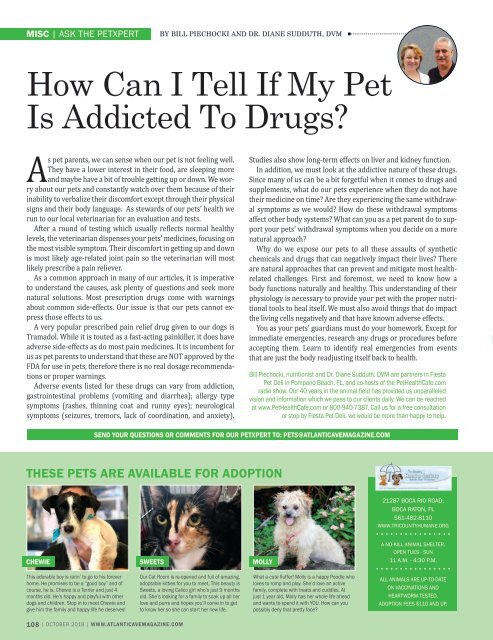Create successful ePaper yourself
Turn your PDF publications into a flip-book with our unique Google optimized e-Paper software.
misc | ask the petxpert<br />
BY Bill Piechocki and Dr. Diane Sudduth, DVM<br />
How Can I Tell If My Pet<br />
Is Addicted To Drugs?<br />
As pet parents, we can sense when our pet is not feeling well.<br />
They have a lower interest in their food, are sleeping more<br />
and maybe have a bit of trouble getting up or down. We worry<br />
about our pets and constantly watch over them because of their<br />
inability to verbalize their discomfort except through their physical<br />
signs and their body language. As stewards of our pets’ health we<br />
run to our local veterinarian for an evaluation and tests.<br />
After a round of testing which usually reflects normal healthy<br />
levels, the veterinarian dispenses your pets’ medicines, focusing on<br />
the most visible symptom. Their discomfort in getting up and down<br />
is most likely age-related joint pain so the veterinarian will most<br />
likely prescribe a pain reliever.<br />
As a common approach in many of our articles, it is imperative<br />
to understand the causes, ask plenty of questions and seek more<br />
natural solutions. Most prescription drugs come with warnings<br />
about common side-effects. Our issue is that our pets cannot express<br />
those effects to us.<br />
A very popular prescribed pain relief drug given to our dogs is<br />
Tramadol. While it is touted as a fast-acting painkiller, it does have<br />
adverse side-effects as do most pain medicines. It is incumbent for<br />
us as pet parents to understand that these are NOT approved by the<br />
FDA for use in pets, therefore there is no real dosage recommendations<br />
or proper warnings.<br />
Adverse events listed for these drugs can vary from addiction,<br />
gastrointestinal problems (vomiting and diarrhea); allergy type<br />
symptoms (rashes, thinning coat and runny eyes); neurological<br />
symptoms (seizures, tremors, lack of coordination, and anxiety).<br />
Studies also show long-term effects on liver and kidney function.<br />
In addition, we must look at the addictive nature of these drugs.<br />
Since many of us can be a bit forgetful when it comes to drugs and<br />
supplements, what do our pets experience when they do not have<br />
their medicine on time? Are they experiencing the same withdrawal<br />
symptoms as we would? How do these withdrawal symptoms<br />
affect other body systems? What can you as a pet parent do to support<br />
your pets’ withdrawal symptoms when you decide on a more<br />
natural approach?<br />
Why do we expose our pets to all these assaults of synthetic<br />
chemicals and drugs that can negatively impact their lives? There<br />
are natural approaches that can prevent and mitigate most healthrelated<br />
challenges. First and foremost, we need to know how a<br />
body functions naturally and healthy. This understanding of their<br />
physiology is necessary to provide your pet with the proper nutritional<br />
tools to heal itself. We must also avoid things that do impact<br />
the living cells negatively and that have known adverse effects.<br />
You as your pets’ guardians must do your homework. Except for<br />
immediate emergencies, research any drugs or procedures before<br />
accepting them. Learn to identify real emergencies from events<br />
that are just the body readjusting itself back to health.<br />
Bill Piechocki, nutritionist and Dr. Diane Sudduth, DVM are partners in Fiesta<br />
Pet Deli in Pompano Beach, FL, and co-hosts of the PetHealthCafe.com<br />
radio show. Our 40 years in the animal field has provided us unparalleled<br />
vision and information which we pass to our clients daily. We can be reached<br />
at www.PetHealthCafe.com or 800-940-7387. Call us for a free consultation<br />
or stop by Fiesta Pet Deli, we would be more than happy to help.<br />
SEND YOUR QUESTIONS OR COMMENTS FOR OUR PETXPERT TO: PETS@ATLANTICAVEMAGAZINE.COM<br />
these pets are available for adoption<br />
21287 Boca Rio Road,<br />
Boca RaTON, FL<br />
561-482-8110<br />
www.tricountyhumane.org<br />
chewie<br />
sweets<br />
molly<br />
A NO-KILL animal shelter.<br />
Open Tues - Sun<br />
11 a.m. - 4:30 p.m.<br />
This adorable boy is rarin’ to go to his forever<br />
home. He promises to be a “good boy” and of<br />
course, he is. Chewie is a Terrier and just 4<br />
months old. He’s happy and playful with other<br />
dogs and children. Stop in to meet Chewie and<br />
give him the family and happy life he deserves!<br />
Our Cat Room is re-opened and full of amazing,<br />
adoptable kitties for you to meet. This beauty is<br />
Sweets, a loving Calico girl who’s just 9 months<br />
old. She’s looking for a family to soak up all her<br />
love and purrs and hopes you’ll come in to get<br />
to know her so she can start her new life.<br />
What a cute fluffer! Molly is a happy Poodle who<br />
loves to romp and play. She’d love an active<br />
family, complete with treats and cuddles. At<br />
just 1 year old, Molly has her whole life ahead<br />
and wants to spend it with YOU. How can you<br />
possibly deny that pretty face?<br />
All animals are up-TO-date<br />
on vaccinations and<br />
heartworm tested.<br />
Adoption fees $110 and up.<br />
108 | OCTOBER <strong>2018</strong> | www.<strong>Atlantic</strong><strong>Ave</strong><strong>Magazine</strong>.com


















